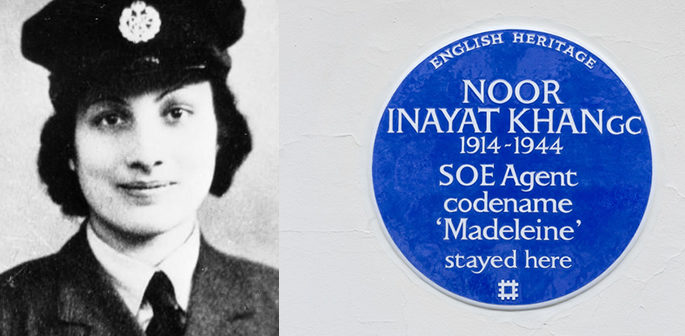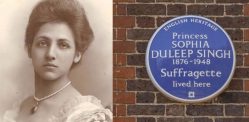"one day she would become a symbol of bravery."
World War II spy Noor Inayat Khan has been honoured with a blue plaque in London.
She has become the first woman of South Asian descent to be recognised by English Heritage after first being nominated in 2006.
Her former family home in Bloomsbury has received the blue plaque.
Khan received the George Cross for her exploits in Paris, where she volunteered as a radio operator.
Anna Eavis, the curatorial director of English Heritage, said it was vital that a more diverse selection of blue plaques were awarded, but they still needed more public nominations for people of colour in order to address the racial imbalance.
She said: “The continuing diversity of London’s population means that it is very important that public-realm schemes like this are more representative and tell the whole story.”
Khan was born in 1914 in Moscow but her family moved to Bloomsbury in London’s West End at the outset of the First World War.
They then moved to France, where she looked after her mother and siblings following her father’s death.
In 1940, the family fled occupied France to Falmouth, Cornwall, where Khan joined the Women’s Auxiliary Air Force and trained as a radio operator.
She was recruited by Winston Churchill’s Special Operations Executive (SOE) and sent back to France as an undercover radio operator under the name ‘Madeleine’.
Khan worked successfully for three months before being captured by the Gestapo, the secret police of Nazi Germany. She had been betrayed by a French double agent, who was reportedly paid to hand her over.
Khan was questioned by Gestapo agents before she managed to escape with other SOE members.
However, she was recaptured and kept in Pforzheim prison before being moved to Dachau concentration camp where she was executed in 1944.
Shrabani Basu, Khan’s biographer, applied for the plaque and will unveil it on Taviton Street at 7 pm on August 28, 2020, in a virtual ceremony.
She said: “When Noor Inayat Khan left this house on her last mission, she would never have dreamed that one day she would become a symbol of bravery. She was an unlikely spy.
“As a Sufi, she believed in non-violence and religious harmony. Yet when her adopted country needed her, she unhesitatingly gave her life in the fight against fascism.
“It is fitting that Noor Inayat Khan is the first woman of Indian origin to be remembered with a blue plaque. As people walk by, Noor’s story will continue to inspire future generations.
“In today’s world, her vision of unity and freedom is more important than ever.”
Ms Basu said Khan screamed “Liberte” before she was executed.
“They could not kill her spirit and that is what I take away from her story.”
Khan’s plaque comes after English Heritage admitted the number of women represented by the scheme is “still unacceptably low”, with only 14% of London’s 950 plaques representing women.
The charity said that “if we are to continue to see a significant increase in the number of blue plaques for women, we need more female suggestions”.





























































